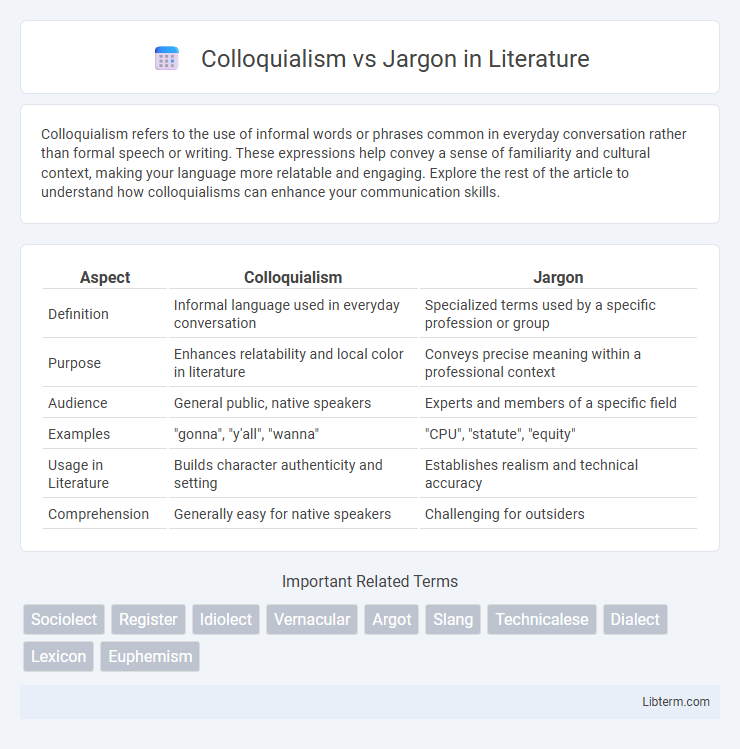Colloquialism refers to the use of informal words or phrases common in everyday conversation rather than formal speech or writing. These expressions help convey a sense of familiarity and cultural context, making your language more relatable and engaging. Explore the rest of the article to understand how colloquialisms can enhance your communication skills.
Table of Comparison
| Aspect | Colloquialism | Jargon |
|---|---|---|
| Definition | Informal language used in everyday conversation | Specialized terms used by a specific profession or group |
| Purpose | Enhances relatability and local color in literature | Conveys precise meaning within a professional context |
| Audience | General public, native speakers | Experts and members of a specific field |
| Examples | "gonna", "y'all", "wanna" | "CPU", "statute", "equity" |
| Usage in Literature | Builds character authenticity and setting | Establishes realism and technical accuracy |
| Comprehension | Generally easy for native speakers | Challenging for outsiders |
Understanding Colloquialism: Definition and Examples
Colloquialism refers to informal language or expressions used in everyday conversation, often specific to a particular region or social group, such as "gonna" for "going to" or "y'all" for "you all." Understanding colloquialism involves recognizing these casual, conversational phrases that differ from formal language yet convey cultural and social nuances. Examples include phrases like "kick the bucket" meaning to die or "piece of cake" indicating something easy, highlighting how colloquialisms enrich communication by reflecting local speech patterns and idiomatic usage.
What Is Jargon? Key Features and Usage
Jargon refers to specialized terminology used within particular professions, industries, or social groups, facilitating precise and efficient communication among insiders. Key features of jargon include technical vocabulary, abbreviations, and acronyms that often remain unclear to outsiders. Usage of jargon enhances clarity and productivity in professional contexts but can create barriers to understanding for general audiences.
Colloquialism vs Jargon: Core Differences
Colloquialism refers to informal language used in everyday conversation, characterized by regional expressions and slang that vary across communities. Jargon consists of specialized terminology specific to particular professions or groups, designed to convey precise meanings within that domain. The core difference lies in purpose and usage: colloquialisms foster casual, relatable communication, while jargon aims for clarity and efficiency among experts.
Origins and Evolution of Colloquial Language
Colloquial language originates from everyday spoken expressions that evolve naturally within communities, reflecting cultural and social changes over time. It adapts rapidly through informal communication, incorporating slang and regional dialects to maintain relevance and accessibility. Unlike jargon, which develops within specialized professions, colloquialism spreads broadly, shaping language through popular usage and social interaction.
The Role of Jargon in Professional Communication
Jargon plays a crucial role in professional communication by providing precise terminology that facilitates efficient and clear exchanges within specialized fields. It helps professionals convey complex ideas succinctly, reducing ambiguity and enhancing mutual understanding among experts. However, overuse or misuse of jargon can create barriers for those outside the industry, underscoring the importance of context-aware communication.
How Colloquialism Shapes Everyday Conversation
Colloquialism shapes everyday conversation by injecting informal, region-specific language that makes communication relatable and lively. These expressions reflect cultural identity and social context, enabling speakers to connect on a personal level and convey emotions succinctly. Unlike jargon, which is specialized terminology for professional fields, colloquialisms enhance casual dialogue and foster community understanding.
The Impact of Jargon on Group Identity
Jargon serves as a specialized language that reinforces group identity, creating a sense of belonging among members by using terms understood exclusively within the community. It can both include insiders and exclude outsiders, strengthening group cohesion while potentially alienating those unfamiliar with the terminology. This linguistic barrier often solidifies social boundaries and emphasizes the unique culture of the group.
Misunderstandings Caused by Colloquialism and Jargon
Misunderstandings caused by colloquialism often arise from regional expressions or informal language that confuse non-native speakers or individuals unfamiliar with specific local contexts. Jargon can create barriers when specialized terms or industry-specific language exclude or alienate those outside the field, leading to misinterpretation or communication breakdowns. Both colloquialism and jargon risk impeding clear communication by relying on knowledge that may not be shared by all participants in a conversation.
Adapting Language: When to Use Colloquialism or Jargon
Colloquialism is best used in informal settings to create relatability and ease of understanding, making communication more engaging and approachable. Jargon, however, is appropriate in professional or technical contexts where precision and shared knowledge are crucial among experts. Adapting language effectively depends on the audience's familiarity with the terms and the communication's purpose to either simplify or specialize the message.
Bridging the Gap: Enhancing Clarity Across Language Barriers
Bridging the gap between colloquialism and jargon enhances clarity by translating specialized terms into everyday language, making information accessible across diverse audiences. Understanding the context and cultural nuances behind colloquial expressions prevents misinterpretation in communication between professionals and the general public. Effective use of plain language and targeted explanations reduces confusion, facilitating clearer exchanges in multilingual and multidisciplinary environments.
Colloquialism Infographic

 libterm.com
libterm.com